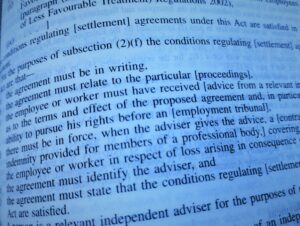

Last updated in 14 October 2022

A settlement agreement is offered by employers to settle employee claims in exchange for a benefit or payment. The employee must be advised by a qualified independent legal adviser on the agreement. Usually a settlement agreement will involve the employee’s employment coming to an end.
Settlement agreements are all about achieving a legally binding settlement between an employee and employer on agreed terms.
Usually, it’s for speed, risk-management, certainty and closure.
The general idea is that Settlement Agreements achieve a clean break with the certainty that in return for the payment, the employee will not be be able to bring employment claims.
A settlement agreement means claims and disputes are quickly settled in a legally-binding document. Everyone can move on.
But settlement agreements can also be used to settle existing disputes with employees, without the employee leaving the company.
Each settlement agreement differs, and the terms are only decided once any negotiations have taken place. However, as a general rule, a typical settlement agreement will include or cover:
| Summary | Detail |
| Payments to you: | such as notice pay, holiday pay, bonuses, redundancy pay, and any additional termination payment. |
| Termination Date: | when your employment will end, whether you’ll work your notice period and do a handover. |
| Benefits: | any continued benefits – e.g. company car, pension, share schemes, private health. |
| Tax : | which paments will have tax deductions and who bears the liability for further tax. Usually there is a clause that says the employee will have to pay the employer if HMRC decides there is more tax. |
| Confidentiality: | the employee is usually required to keep the employer’s information confidential and the settlement secret. These clauses are also called Non-Disclosure Agreements. |
| Bad mouthing: | the agreement normally requires the employee to agree not to badmouth the employer and its staff. An employee may want to seek a similar promise from the employer. |
| Property: | the employee is required to return company property. Where the employee is entitled to keep property, like a mobile handset, this should be specified. |
| Legal fees: | how much the employer will pay towards the employee getting solicitor advice. |
| Reference: | the wording of any agreed reference your employer will send on request to your new employer. |
| Settlement of claims: | that the employee waives any claims – there’s often a long list of claims listed in the agreement, with every possible employment claim imaginable. Often the only claims an employee can still bring after they sign relate to hidden personal injurys, accrued pension rights, and to enforce the settlement agreement. |
| Directors & shareholders: | if you’re a Director there will usually be a clause confirming you will resign from any office held, and dealing with shares, options and long-term incentives. |
| Repayment of settlement money: | most agreements contain warranties (promises made by you) that the employee will want to rely on to recover the monies if those promise are untrue. For example, you promise you have not committed gross misconduct during your employment. Your solicitor should explain these and advise. |
| Legal small print: | settlement agreements are often full of legal jargon but normally its all pretty standard and not something to be concerned about. Your solicitor should check and explain everything in plain English. |
You need a solicitor because the law requires the employee to have independent legal advice from an independent qualified adviser, which usually means a qualified solicitor or a barrister. Without this advice it would not be a binding statutory settlement agreement.
The settlement agreement must identify the solicitor that advises the employee on the terms and the effect of the agreement. Importantly, the solicitor must be independent, so it can’t be the same solicitor that is advising the employer.
Employment law is a fast paced unique area of the law so its best to find a specialist employment solicitor to advise you – not someone that dabbles or spends most of their days on other legal issues.
The best time to negotiate the deal is before its struck. Yes, I know, that sounds obvious but it’s true. If you accept the offer in principle, and then you change your mind later after you’ve spoken to your solicitor, it may be more difficult to get your employer to budge.
If you’re not happy with the first offer, you can try and negotiate yourself. A mix of bluster, gamesmanship and trading-off good personal connections with the decision-makers may help you to get a better deal. But your employer probably isn’t going to be persuaded to increase the offer significantly unless you can communicate the strength of your case. So research the law and think about instructing an employment solicitor to negotiate your settlement deal.
Generally speaking any payments you are entitled to under your employment contract like salary, holiday pay, bonuses and payment in lieu of notice are taxable but a termination payment, including a redundancy payment, is not taxable up to £30,000.
However, if you have not fully worked (or been paid in lieu of) the contractual notice period your employer is required to serve under your employment contract, a proportion of the termination payment that is equal to the value of the unserved (or unpaid) notice will usually be taxable. This is known as post-employment notice pay.
The price you pay for receiving a settlement offer is almost always going to be a requirement not to tell others about the deal, the terms or how much you are getting. There are standard exceptions in most agreements that say you can speak to your spouse or partner, provided they keep it confidential.
The agreement should make clear you can still speak to the police or a regulator, about a criminal issue or misconduct, or raise a concern in accordance wiht the whistleblowing law. Sometimes the agreement may say you can speak to a recruiter or prospective employer to confirm your employment history when applying for a new job, or an insurer about income protection claims.
But generlly, its mums the word.
Breaching the agreement by talking about the settlement could mean your employer is able to recover part or even all of the settelement payment.
If you a director of the company, registered at companies, house, you will need to consider specific clauses regarding that. Usually there will be a clause in the agreement confirming you will resign as a director, without further compensation. You might also need to include clauses regarding any shares or long-term incentive plans, to protect these interests as far as possible. And securing a committment from the company to maintain adequate Director and Officer insurance protection that protects the exiting director should be considered.
It may come as a suprise to hear that there is no general right to a reference. So if you have been offered a settlement agreement you may wnt to seek a agreement reference wording, as part of the settlement negotiations.
Also called restrictive covenants, these are often contained in the employment contract or a seperate documents signed by the employee. The purpose of these covenants is to limit what an employee can do after he /she leaves, for example, to prevent them dealing with or solicitor the former employer’s customers or poaching its employees. A settlement agreement negotition may include seeking to be released from these restrictions or a reduction in their scope.
Yes, usually. It’s standard for employers to pay a reasonable sum to cover the employee’s independent solicitor’s advice on the terms of and effect of the settlement agreement.
Is a settlement agreement the same as redundancy?Redundancy is a potentially fair reason to end an employee’s employment. But often an employer will ask an employee to sign a settlement agreement in exchange for an enhanced redundancy package.
Can an employee request a settlement agreement?Yes but usually an employer will begin a settlement agreement process to resolve a dispute or agree severance terms.
When can I make a settlement agreement offer?An offer can be made at any time during or after employment.
It means the document or letter cannot be used in any subsequent court or tribunal and that the offer is conditional upon full written terms of a settlement agreement being reached.
What is a Protected Conversation?A protected conversation occurs when an offer of a settlement agreement is made and it means provided the offer was properly made it is not admissible in subsequent ordinary unfair dismissal claim.
Settlement or employment tribunal?A settlement offers certainty, a quick conclusion, lower costs and managed risks. A tribunal on the other hand offers no certainty – you might loss or win, and often it takes several months or even years to get to a final hearing. Weigh up the risk and reward of the tribunal versus the settlement.
Who can advise on a settlement agreement?Settlement agreements are not binding unless the employee receives independent legal advice on the terms and effect of the agreement.
This includes qualified and practising Barristers and Solicitors, some Legal Executives subjec to additional requirements, Trade Union Officials certified by the union as competent to give advice and authorised to do so on the union’s behalf, and some voluntary advice workers working for an advice centre that are certified as competent and meet other restrictions.
Should I accept a settlement offer?That really does depend on the quality of the offer versus the alternatives. If you have a strong case worth substantially more than the settlement offer, then maybe. A quick resolution might be worth taking the settlement versus the risks, time and possible costs of a tribunal. We recommend you talk to a specialist employment solicitor and weigh up the merits of the offer against the alternative options available.
What’s a good settlement offer?It depends. In some cases it’s all about the money. In others, there may be non-monetary considerations, like a reference or being released from post-termination restrictions.
Start with your basic contractual and statutory rights and then assess what else your employer is offering on top in exchange for you signing a settlement agreement.
If the offer isn’t anywhere near the ballpark you’d accept, you may decide to reject it and make it clear you see no point making a counter offer as your miles apart. That’s a bold strong move but risks killing off the negotiations and pushing you towards a dispute and tribunal claim.
The alternative is to make a sensible counter offer with room between the two positions to allow further compromise. The key word being ‘sensible’. As much as a low offer may end an negotiation so might a very high offer. Pitching the offer at a level that makes sense for both sides is the art of a good settlement agreement negotiation.
Speak to a Solicitor – FreePhone 0808 196 9145